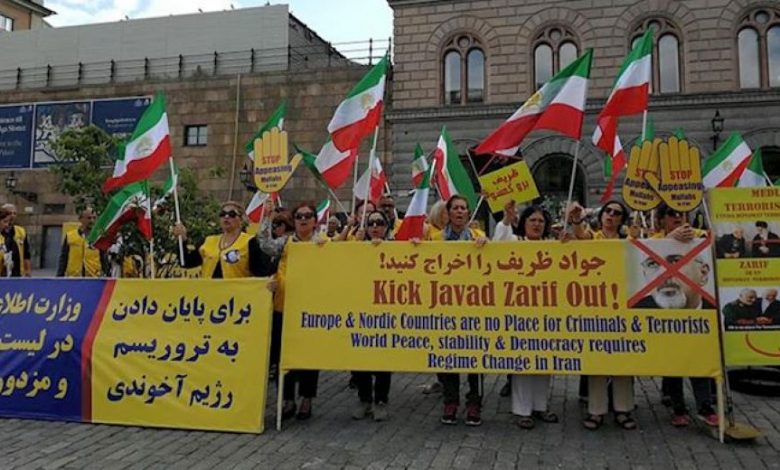The Trial of Assadi, Iran Regime’s Diplomat-Terrorist, and Its Significance
Demonstration against Iranian diplomat-terrorists in Europe (file photo)

Written by
Mansoureh Galestan
Demonstration against Iranian diplomat-terrorists in Europe (file photo)
Recent reports by international media outlets reported incarcerated diplomat-terrorist of the Iranian regime in Belgium, Assadollah Assadi, has threatened authorities of possible terrorist attacks if he is convicted. The question is, why Assadi issued such a threat? And what is the significance of his trial?
The terrorist-diplomat, who served as the third counselor at Iran’s embassy in Vienna, was arrested in 2018 following a foiled bombing plot he commanded against the annual “Free Iran” rally of the National Council of Resistance of Iran (NCRI) in Paris. Assadi used his diplomatic privileges to transfer 500 grams of TATP explosives to Europe and personally deliver it to two other terrorists.
Assadi’s threats against the Belgian authorities, where he will be tried on charges of terrorism, and how he used his diplomatic cover to transfer explosives to Europe, suggest Assadi and his masters in Iran have counted on the long time inaction of the European powers.
This is not the first time the clerical regime’s diplomat-terrorists carry out assassination plots in Europe by using their diplomatic cover. In 1990, the Iranian regime’s agents, who had traveled to Switzerland with diplomatic passports, assassinated Dr. Kazem Rajavi, NCRI’s representative in Switzerland, near his house. Some of the agents were arrested in France but later released and went to Iran.
In other words, years of the EU’s appeasement policy toward the mullahs’ regime and succumbing to mullahs’ terrorist extortion campaigns have encouraged the regime to attempt a huge bombing plot in Europe. And once questioned or arrested, the prime suspect either flees or threatens authorities.
The foiled bombing plot of 2018 once again showed the regime’s terrorist nature. But as Giulio Terzi, former Italian Foreign Minister, said during a recent NCRI’s conference on Thursday, “We didn’t need the attempted terrorist attack in Villepinte to prove that the Iranian theocratic state is the number one terrorist state in the world.”
Mr. Terzi further suggested that Europeans “cannot wait any longer in increasing across the board in all possible sectors of diplomatic relations. We cannot wait any longer to implement a strategy of maximum pressure against this regime of associates. Tehran must understand that it will pay the heaviest of the prices. “
If Tehran does not pay the price for its terrorism, it will increase its terrorist activities. Because as Mr. Claude Moniquet, a former French top security and counterterrorism official, said on Thursday, “Terror is just the political tool the mullah regime could decide to use at one moment. Where it is confronted, to try to advocate its interest and it goes.”
Although terrorism is an inseparable part of the regime, as Moniquet said, the regime’s consistent terrorism is partly due to the “European weakness.” “Since the 1980s and the 1990s, the mullah regime has conducted numerous terrorist operations against European interests, both in Europe and other parts of the world,” Mr. Moniquet continued, “So, clearly, there was no real answer to the European answer to those terrorist threats and those terrorist actions. And Tehran understood that it was possible to threaten and even to attack Europe without having any price to pay.”
Significance of Assadi’s trial
Infuriated over the transfer of members of the People’s Mojahedin Organization of Iran (PMOI/MEK) to Albania and having their regime’s foundations rattled after the major Iran protests in 2018, mullahs tried to eliminate their viable alternative at any possible price.
In other words, the thwarted 2018 bombing plot was not Assadi’s personal initiative. This was the decision by the regime’s Supreme National Security Council. This council is headed by mullahs’ president Hassan Rouhani, approved by Supreme Leader Ali Khamenei, and attended by the regime’s Minister of Foreign Affairs, Mohammad Javad Zarif, Ministry of Security and Intelligence (MOIS) and commanders of the Revolutionary Guards (IRGC).
As Ambassador Robert Joseph, former U.S. undersecretary of the Arms Control, told Thursday’s conference, this bombing plot “is not an isolated case or an action of rogue agents.” As Ambassador Joseph said, “it is part of an orchestrated campaign directed at the highest levels of government in Tehran.”
Therefore, an Iranian diplomat’s unprecedented trial while on duty for terrorism and convicting him is also challenging the entire terrorist regime. Assadi’s conviction sends the message of firmness to the regime’s leaders that terrorism will not be tolerated. All the perpetrators of this terrorist plot, including Khamenei, Zarif, and Rouhani, should be held accountable.
Holding the regime to account for terrorism will cripple its terrorism against Iranian dissidents and prevent serious threats by the number one state-sponsor of terrorism in the world, endangering the lives of citizens of other countries.
The Trial of Assadi, Iran Regime’s Diplomat-Terrorist, and Its Significance

